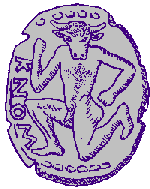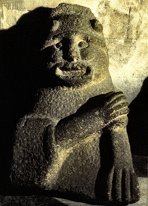


|

DIALOGUE
WITH HIS HEART
four
poems by
FRANÇOIS
VILLON
(1431-1463 or later)
translated by Anthony Weir
revised versions of those published
in Tide and Undertow, Belfast
1975
_______________
François Villon was for a while at the court of Charles d'Orléans,
himself a very fine poet and father of the future Louis XII.
Like Jean
Genet, Villon was a thief, a poet and philosopher who got taken
up by the rich and famous.
Genet was a fostered child, and Villon was an orphan adopted by his uncle
of that name, a scholar and chaplain.
BALLADE OF THE
LADIES OF BYGONE TIMES
from
THE TESTAMENT (1462)
Tell me from where
I could entice
Flora the famous Roman whore,
or Archipiad or Thaice
who they say was just as fair;
or Echo answering everywhere
across stream and pool and mere,
whose beauty was like none before -
where are the snows of yesteryear ?
Where is the learned
Héloïse
for whose love Abelard became
a gelded monk at Saint-Denis,
yet still could not put out his flame ?
And where now is that royal dame
who had men for three days with her
then had them cast into the Seine ?
Where are the snows of yesteryear ?
Queen Blanche who
had a siren's voice,
white as a lily on the plain;
Big-Footed Bertha, by Heaven's choice
mother of great Charlemagne;
and Joan of Arc from proud Lorraine
the English burned from cruel fear -
where are they, where, O Mother of Men ?
Where are the snows of yesteryear ?
Don't ask, Prince,
in one month again,
nor yet in twelve where they all are;
I'd only give you this refrain:
Where are the snows of yesteryear ?
other translations
THE OLD WOMAN
LONGING FOR THE DAYS OF HER YOUTH
(THE LAMENT OF THE "BELLE HËAULMIÈRE")
from THE TESTAMENT
(1462)
I thought I heard
the whore complain
who sold helmets as a cover-trade,
wishing the days would come again
when she was young; and this she said:-
"Old age, a
cruel trick you've played!
Why have you struck me down so soon ?
Who'll care now if I put paid
to a life so long past its high noon ?
"You've robbed
me, left me in the lurch,
taken my beauty and power away.
Businessmen, men of the Church
don't give me all they have today.
"No man was
born who would not pay
all that he had to get that prize
(with some misgiving, I daresay)
which even beggars now despise.
"Many a man
I could have had
but turned down in my dizziness
for true love of a crafty lad
I showered with limitless largesse.
I was unfaithful once or twice -
but Christ! I loved him - love him yet.
He only gave me churlishness
and loved only what he could get.
"He could have
dragged me through the mud
and trampled on me - I would still
have worshipped him. Had he drawn blood
and maimed me, I'd have done his will.
I'd be in misery until
he ordered me to kiss him. Swine!
I was nothing but his swill -
and all I can do now is whine.
"Shame and
sin are all I've left
for thirty years now since he died.
And I live on, old, grey, bereft,
brooding on my prime and pride.
Now look at me - I'm shrunk and dried,
and when I see how I have changed,
ravaged now by time and tide,
the undertow leaves me deranged.
"Where is that
forehead's smooth expanse,
the arched eyebrows and golden hair,
the wide-set eyes, the pretty glance
which caught the wiliest unaware;
that well-proportioned nose, that pair
of little ears, that dimpled chin,
that lovely face so clear and fair
with lips of pure vermilion ?
"Those long
arms, shoulders slim and straight,
fine hands, breasts small and eloquent,
hips high, smooth, full, in perfect state
to enter in Love's tournament;
where are the broad loins and the cunt
between each firm and rounded thigh
set like a lovely ornament
within its little herbary ?
"My forehead's
wrinkled now, and grey
my hair; my eyebrows droop; my eyes
are bleary now whose glance was gay
and drained men's purses with their flies.
There's none a hook-nose will entice
or ears that hang like lumps of moss;
my face is faded, dead as ice;
my chin and lips like withered pods.
"So this is
human beauty's lot -
hands like claws and stumpy arms,
shoulders gnarled up in a knot -
not a trace of former charms.
"Breasts and
hips mere shrunken forms;
my cunt is a long-dried-up spring
my thighs no more than bony worms
all mottled like a sausage-skin.
"And so we
mourn the 'good old days',
poor old fools that we are now,
squatting by a feeble blaze
of straw, like tattered heaps of tow -
so soon aflame, so soon burned low.
Once we were so proud and gay,
beautiful from top to toe.
All flesh is heir to such decay."
|
 Fanciful
statue of François Villon
Fanciful
statue of François Villon
Utrecht, Netherlands.
A
Ballade was a poem which varied in form but usually comprised three
to five verses of 8 to 10 lines and a verse of 4 or 5 lines, with
various rhyme-schemes.
Archipiad[a]
(Archipiade
In French) is a mistake on Villon's part for Alcibiades, whom
Boëthius mentioned as a paragon of beauty - and hence was assumed
to be a woman in the days of Courtly Love.
The
queen who reputedly took lovers for three days, and then had them
hurled into the Seine, was Jeanne of Navarre according to one tradition,
or Margaret of Burgundy (wife of Louis X) according to another.
The apocryphal story of the philosopher Buridan (c.1295-c.1385)
and how he arranged for a barge of hay to be stationed by fellow-students
under the window or balcoiny from which he was to be flung, was
much appreciated and elaborated from the 14th to 19th centuries.
In
Villon's day, too, prostitutes in Paris were subject to much harassment
from the city authorities, and were becoming (or were replaced by)
girls who gained part of their livelihood as shopkeepers, and thus
had a respectable base to work from.
'The Belle Hëaulmière' (sometimes translated as The Beautiful
Armouress) was one of these, and was among the better-known demi-mondaines
in the 1390s. She became the mistress of a very wealthy and powerfulman
- Nicolas d'Orgemont, known as 'The Lame', who. however, became
involved in a mysterious intrigue against Charles VI in 1416, was
imprisoned, and died the same year.
The
Belle Hëaulmière must have suffered a decline in fortune, since,
according to Villon, she lived with a pimp until his death around
1426. When Villon knew her in the 1450s, she was in her eighties,
as decrepit and anguished as The
'Nun' of Beare, the dried-up spring that Rodin
portrayed her in bronze.
This and the previous poem were famously echoed in the 20th
century by Bertholdt Brecht,
and Georges Brassens made a fine song from the Ballade.

|

VILLON'S DIALOGUE
WITH HIS HEART
Who's there ? It's
me. Who's "me" ? Your heart,
that holds on by the merest thread;
I feel my blood ebb and my strength depart
when I see you hanging down your head
like some poor lurcher cringing in a shed.
And why is that ? Because you live too fast.
So what ? It's I who come off worst.
Why, you ask ? I'll think about it. Let me be!
When will you start thinking ? When my childhood's past.
I'll say no more. That's quite all right with me.
What do you want
? To be a man of substance.
You're thirty now. No younger than a mule.
Is that still childhood ? No. Then madness
has got hold of you/ Where ? By the lapel ?
You know nothing. Yes I do: I can tell
the difference between flies and milk. One's white,
one's black. Is that all ? Is that too trite
for you ? I'll start again. Let's see..
You're lost. Well, I'll put up a fight.
I'll say no more. That's quite all right with me.
From all this
I get sorrow, you get pain.
If you had been some poor demented fool
I might have had some reason to complain,
but good and bad you wind from the same spool.
Either your head is filled with wool
or else you want damnation more than bliss.
Well, what is your reply to this ?
I'll be above it when I pass away.
God, how comforting! What wisdom and what eloquence!
I'll say no more. That's quite all right with me.
Where do your
defects come from ? From ill-luck.
When Saturn packed my bag for me
he put them in. What rubbish! You're star-struck.
You are master yet think yourself unfree.
Solomon has written - you can see
it in the Bible -
'Men of sense
have power over planets and their influence'.
I don't believe it. As they made me, so I'll be.
What did you say ? Just my kind of sense.
I'll say no more. That's quite all right with me.
You want to live
? May God give me the power!
You must then... What ?! Read every hour,
be penitent. Read what ? Philosophy -
and leave your trivial friends. I'll see.
Now don't forget. Don't be perverse;
don't wait so long that things get even worse.
I'll say no more. That's quite all right with me.
|

|
L'EPITAPHE
En
forme de ballade
que feit Villon pour luy et ses compagnons,
s'attendant estre pendu avec eux.
Freres
humains qui apres nous vivez,
N'ayez les cuers contre nous endurcis,
Car, se pitié de nous povres avez,
Dieu en aura plus tost de vous mercis.
Vous nous voiez cy attachez cinq, six:
Quant de la char, que trop avons nourrie,
Elle est pieça devoree et pourrie,
Et nous, les os, devenons cendre et pouldre.
De nostre mal personne ne s'en rie;
Mais priez Dieu que tous nous veuille absouldre!
Se
vous clamons, freres, pas n'en devez
Avoir desdaing, quoy que fusmes occis
Par justice. Toutefois, cous sçavez
Que tous hommes n'ont pas bon sens rassis;
Excusez nous, puis que sommes transis,
Envers le fils de la Vierge Marie,
Que sa grace ne soit pour nous tarie,
Nous preservant de l'infernale fouldre.
Nous sommes mors, ame ne nous harie;
Mais priez Dieu que tous nous veuille absouldre!
La pluye nous a buez et lavez,
Et le soleil dessechiez et noircis;
Pies, corbeaulx nous ont les yeux cavez,
Et arrachié la barbe et les sourcis.
Jamis nul temps nous ne sommes assis;
Puis ça, puis la, comme le vent varie,
A son plaisir sans cesser nous charie,
Plus becquetez d'oyseaulx que dez a couldre.
Ne soiez donc de nostre confrarie;
Mais priez Dieu que tous nous veuille absouldre!
ENVOI
Prince
Jhesus, qui sur tous a maistrie,
Garde qu'Enfer n'ait de nous seigneurie:
A luy n'ayons que faire ne que souldre.
Hommes, icy n'a point de mocquerie,
Mais priez Dieu que tous nous vueille absouldre.
|
EPITAPH
in
the form of a Ballade
which Villon composed for himself and his prison companions , while
waiting for the hangman.
Brothers
surviving us the dead,
don't set your hearts against us too.
If you could sympathise instead
then God may sympathise with you.
We five or six strung up to view,
weighed down by flesh we fed too well,
are rotted, pecked and pulled to hell.
We bones will turn to dirt and dust -
don't make us laughing-stocks as well,
but pray God save our souls at last.
If
you're our brothers then you must
feel for us, hung out to dry
by Justice. You have well sussed
how many good folk go awry.
Pray that we sinners are not lost
to Jesu's Grace, nor that we fall fast
into Hell's flaming maw and therein tossed -
but pray God save our souls at last.
Laundered
by the rain of countless skies,
dried and blackened by relentless sun,
rooks and crows have feasted on our eyes
plucked out our beards and eyebrows for their fun.
Never are our broken bodies still
but, swinging with the wind's unrest,
they're pierced by beaks while maggots eat their fill.
Please don't succumb like us to greed and lust.
Don't follow us up Gallows Hill -
but stay and pray God save our souls at last.
REFRAIN
Lord
Jesus, who has dominion over all,
Almighty God, in whom we trust,
keep us this side of the gates of Hell!
Friends living, pay heed to what I tell -
and pray God save our souls at last.
|


MORE
TRANSLATIONS by ANTHONY WEIR
Click
for a translation (with original text) of Pierre de Ronsard's incomparable
sonnet
"Quand
vous serez bien vieille..."
>>

TWO
TRANSLATIONS OF VILLON
INTO LATE-19th CENTURY CANT
by
William Ernest Henley
(1849-1903, English poet, critic and author)
from:
John S. Farmer's Canting Songs and Slang Rhymes
VILLON'S
GOOD NIGHT
I
You bible-sharps that thump on tubs, false
clerics
You lurkers on the Abram-sham, beggar
feigning sickness
You sponges miking round the pubs, cadgers
loafing
You flymy titters fond of flam, saucy
girls; trivial things
You judes that clobber for the stramm, women
dress; game
You ponces good at talking tall,
With fawneys on your dexter famm - rings;
right hand
A mot's good-night to one and all! whore's
II
Likewise you molls that flash your bubs whores
For swells to spot and stand you sam, pay
for
You bleeding bonnets, pugs, and subs, gamblers'
decoys; boxers
You swatchel-coves that pitch and slam. Punch-and-Judy-men
You magsmen bold that work the cram, pattering
tradesman; crowd
You flats and joskins great and small, marsh-dwellers
& country bumpkins
Gay grass-widows and lawful-jam - wife
A mot's good-night to one and all!
III
For you, you coppers, narks, and dubs, police-informers;
warders
Who pinched me when upon the snam, when
I was thieving
And gave me mumps and mulligrubs "the
blues"
With skilly and swill that made me clam, refuse
food
At you I merely lift my gam - leg
I drink your health against the wall! piss
That is the sort of man I am,
A mot's good-night to one and all!
The Farewell
Paste 'em, and larrup 'em, and lamm!
Give Kennedy, and make 'em crawl! thrash
them and make them stir
I do not care one bleeding damn,
A mot's good-night to one and all!

Ballade
de Bonne Doctrine (1461)
VILLON'S STRAIGHT TIP TO ALL CROSS COVES
"Tout aux tavernes et aux filles..."
See
Notes below for translation of the translation!
I
Suppose you screeve, or go cheap-jack ?
Or fake the broads ? or fig a nag ?
Or thimble-rig ? or knap a yack ?
Or pitch a snide ? or smash a rag ?
Suppose you duff ? or nose and lag ?
Or get the straight, and land your pot ?
How do you melt the multy swag ?
Booze and the blowens cop the lot.
II
Fiddle, or fence, or mace, or mack;
Or moskeneer, or flash the drag;
Dead-lurk a crib, or do a crack;
Pad with a slang, or chuck a fag;
Bonnet, or tout, or mump and gag;
Rattle the tats, or mark the spot
You cannot bank a single stag:
Booze and the blowens cop the lot.
III
Suppose you try a different tack,
And on the square you flash your flag ?
At penny-a-lining make your whack,
Or with the mummers mug and gag ?
For nix, for nix the dibbs you bag
At any graft, no matter what!
Your merry goblins soon stravag:
Booze and the blowens cop the lot.
The Moral
It's up-the-spout and Charley-Wag
With wipes and tickers and what not!
Until the squeezer nips your scrag,
Booze and the blowens cop the lot.
Notes
Stanza
I, line I. Screeve = provide (or work with) begging-letters.
Line 2. Fake the broads = pack the cards.
Fig a nag = make an old horse seem lively with a fig stuffed
with ginger stuck up its arse.
Line 3. Knap a yack = steal a watch.
Line 4. Pitch a snide = pass a false coin. Smash a
rag = change a false note.
Line 5. Duff = sell sham smugglings. Nose and lag
= collect evidence for the police.
Line 6. Get the straight = get the office, and back a
winner.
Line 7. Multy (expletive) = bloody.
Line 8. Booze and the blowens cop the lot = drink and
debauchery (i.e. syphilis) will kill you off.
Stanza
II, line 1. Fiddle = swindle. Fence = deal
in stolen goods. Mace = welsh. Mack = pimp.
Line 2. Moskeneer = to pawn for more than the pledge
is worth.
Flash the drag = wear women's clothes for an improper purpose.
Line 3. Dead-lurk a crib = house-break in church time.
Do a crack -burgle with violence.
Line 4. Pad with a slang = tramp with a show.
Line 5. Mump and gag = beg and talk.
Line 6. Tats = dice. Spot, (at billiards).
Line 7. Stag = shilling.
Stanza
III, line 2. Flash your flag = sport your apron.
Line 4. Mug = make faces.
Line 5. Nix = nothing.
Line 6. Graft = trade.
Line 7. Goblins = sovereigns. Stravag = go astray.
The
Moral: Up the spout and Charley Wag = expressions
of dispersal.
Line 2. Wipes = handkerchiefs. Tickers = watches.
Line 3. Squeezer = halter or hangman's noose. Scrag
= neck.
|

top of page
|
|

![]()

![]()




